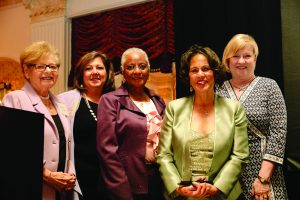The message coming out of Adelphi’s Nursing Leadership Conference on May 1, 2019, was that the profession needs
to take action to protect and improve its reputation, but that nursing schools also need to produce graduates better able to live up to that reputation.
The message coming out of Adelphi’s Nursing Leadership Conference on May 1, 2019, was that the profession needs to take action to protect and improve its reputation, but that nursing schools also need to produce graduates better able to live up to that reputation.
The 15th annual Leadership Conference, cosponsored by the Adelphi University College of Nursing and Public Health and Sigma Theta Tau International’s Alpha Omega Chapter, took place at The Garden City Hotel.
Morning talks by Patricia Benner, PhD—professor emerita, University of California San Francisco, Department of Social and Behavioral Sciences, and currently chief faculty development officer of EducatingNursesVideos.com—and Patricia Hooper Kyriakidis, PhD, NovEx Novice to Expert Learning, Nashville, Tennessee—emphasized that we are graduating students who are book- smart but ill-prepared to live up to the challenges of the profession.
“All leaders in healthcare are riding white water these days,” Dr. Benner said, speaking via live video. “Things are changing very, very fast.”
In a highly competitive and rapidly changing technological environment, she said, students are learning the facts of the field but they’re not learning how to think on their feet, she said. As a simplified example, she noted that someone can be taught how to take a patient’s blood pressure in 10 minutes but that doesn’t mean they’ll know how to evaluate the indications of the result. Classroom learning also doesn’t prepare students for working long hours or early morning shifts, she said, or to respond quickly to crisis situations.

Dr. Benner likened the dual demands of crisis response and technological expertise to being “somewhere between fighting forest fires and space travel” and said that the profession needs to take ownership of evaluating and publicizing its value and its growth.
Industry leaders need to “give public language to what we’re accomplishing,” she said. “It’s dangerous for nursing to be invisible.”
In a talk titled “Preparing Practice-Ready Nurses: A Mandate for the Future” following Dr. Benner’s videoconference, Dr. Kyriakidis underscored the lack of practical training for nursing students. She emphasized the problems it can cause them on their first job when they’re seen as not being ready for the job.
“The stress and alienation that occurs when younger nurses aren’t practice-ready becomes personalized, rather than understanding that the training was not there,” she said.
Dr. Kyriakidis has written extensively about practice-readiness and in her talk acknowledged Dr. Benner’s work on the subject. She specifically cited a 2009 Carnegie Study co-authored by Dr. Benner, titled “Educating Nurses: A Call for Radical Transformation,” that identified the shortcomings in classroom education. “We haven’t changed the way we teach” in the decade since the study was published, she noted.
Lab simulation classes need to include unprompted, unfolding patient situations based on real cases and conducted without prompting questions, she said. Students need to learn on their feet, she stressed. “If we don’t set the students up to problem-solve, we will not produce practice-ready nurses.”
For further information, please contact:
Todd Wilson
Strategic Communications Director
p – 516.237.8634
e – twilson@adelphi.edu